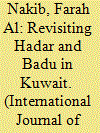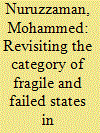| Srl | Item |
| 1 |
ID:
131513


|
|
|
|
|
| Publication |
2014.
|
| Summary/Abstract |
Kuwait today is 99 percent urbanized. Though hosting a substantial desert population in the past, Kuwait no longer contains any Bedouin who practice a nomadic or pastoral lifestyle. And yet the term bad? remains in popular use in Kuwait to designate a group considered sociologically and culturally distinct from the ?a?ar, or settled urbanites, which in Kuwait's context refers solely to descendants of the pre-oil townspeople. This article explores why these social designations still exist in Kuwait and analyzes the origins of the conflictual relationship between the two groups. I argue that the persistence of the ?a?ar/bad? dichotomy is an outcome of state-building strategies adopted in the early oil years, mainly linked to citizenship and housing policies, that contributed to fixing ?a?ar and bad? as not only socially distinct but also geographically bounded groups. These state policies implemented between the 1950s and 1980s fostered the political integration but social exclusion of the bad?. The article examines the lived realities of these incoherent policies as one way of explaining how the bad? shifted from being the rulers' main loyalty base in the early oil decades to becoming their primary opposition today.
|
|
|
|
|
|
|
|
|
|
|
|
|
|
|
|
| 2 |
ID:
101266


|
|
|
|
|
| Publication |
2010.
|
| Summary/Abstract |
International Relations scholars and policy-makers are increasingly paying greater attention to a new category of fragile and failed states across Asia, Africa, the Balkans, the Caucasus, Latin America and the Middle East. While effective policy responses are necessary to strengthen these politically fractured, economically collapsing and socially divided states, the category itself appears to be more politically and ideologically charged and less critically understood in the context of international relations. There is a general tendency to avoid examining how political and economic policies and military actions by the West contributed to the degeneration of these states. This article seeks to re-examine the causes of state fragility and failure, and critically reviews the current US strategies to rebuild the failed states of Afghanistan and Iraq. It argues that the US-led statebuilding strategies in both countries are based on a wrong diagnosis of the political and social problems, and the solutions offered are also ill-conceived. The article also contends that the Western liberal vision of the state, premised on the Weberian notion, commands less relevance to the fragile and failed states in the non-Western world.
|
|
|
|
|
|
|
|
|
|
|
|
|
|
|
|